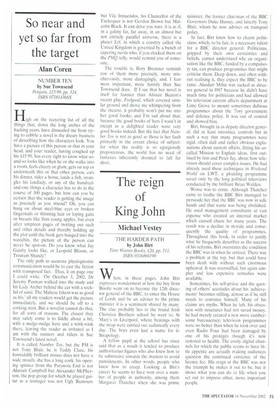The reign of King John
Michael Vestey
THE HARDER PATH by John Birt Time Warner Books, £20, pp. 511, ISBN 0316860190 When, in these pages, John Birt expresses wonderment at how the boy from Bootle went on to become the 12th director general of the BBC, to enter the House of Lords and be an adviser to the prime minister it is a sentiment shared by many. The clue probably lies in the brutal Irish Christian Brothers school he went to, St Mary's in Liverpool, where beatings with the strap were carried out sadistically every day. The boys even had a name for it: Strap°logy.
A fellow pupil at the school has since said that as a result it tended to produce authoritarian figures who also knew how to be submissive towards the masters to avoid punishments. In other words, people who knew how to creep. Looking at Birt's career he seems to have won over a number of people in authority, among them Margaret Thatcher when she was prime minister, the former chairman of the BBC Governors Duke Hussey, and latterly Tony Blair, whom he now advises on transport policy.
In fact, Birt knew how to charm politicians, which, to be fair, is a necessary talent for a BBC director general. Politicians, gripped by their own certainties and beliefs, cannot understand why an organisation like the BBC, funded by a compulsory tax, can produce programmes that might criticise them. Deep down, and often without realising it, they expect the BBC to be tame. Alasdair Milne was sacked as director general in 1987 because he didn't have much time for politicians and had allowed his television current affairs department at Lime Grove to mount sometimes dubious programmes about the Tory government and defence policy. It was out of control and showed bias.
Birt, brought in as deputy director general, did at least introduce controls but in such a way that many programmes were rigid, often dull and rather obvious explanations about current affairs, fitting his socalled Mission to Explain ideas, first outlined by him and Peter Jay, about how television should cover complex issues. He had already used these techniques in Weekend World on LWT, a plodding programme saved only by the long political interviews conducted by the brilliant Brian Walden, Worse was to come. Although Thatcher came to loathe the BBC Birt managed to persuade her that the BBC was now in safe hands and that waste was being abolished. He used management consultants at vast expense who created an internal market which caused chaos for many years. The result was a decline in morale and consequently the quality of programmes. Throughout this book, in order to justify what he frequently describes as the success of his reforms. Birt overstates the condition the BBC was in when he arrived. There was a problem at the top, but that could have been dealt with without such enormous upheaval. It was overstaffed, but again simpler and less expensive remedies were available.
Sometimes, his self-praise and the quoting of others' accolades about his 'achievements' becomes stifling, almost as if he still needs to convince himself. Many of his claims are myths. When he left, his obsession with structures had not saved money, he had merely created a new more cumbersome bureaucracy: television programmes were no better than when he took over and even Radio Four had been damaged by one of his proteges though it's now restored to health, The costly digital channels for which the public seems to have little appetite are actually making audiences question the continued existence of the licence fee. His reign at the BBC was not the triumph he makes it out to be, but it shows what you can do in life when you set out to impress other, more important people.


























































































 Previous page
Previous page